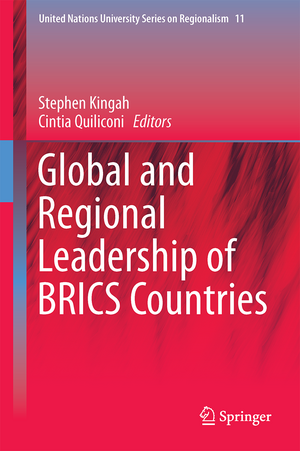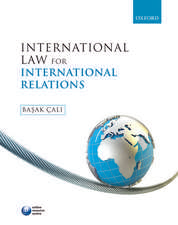Global and Regional Leadership of BRICS Countries: United Nations University Series on Regionalism, cartea 11
Editat de Stephen Kingah, Cintia Quiliconien Limba Engleză Hardback – 24 noi 2015
It is taken for granted that Brazil, Russia, India, China and South Africa are now engineering a unique pool of governance that is seeking alternatives to the current order of global economic and political affairs. The fact that these countries have jointly decided to forge ahead with the BRICS constellation of states that is now taking consequential decisions such as the creation of the BRICS’ New Development Bank, is not to be treated lightly. In this book the majority of papers take a step back and systematically analyse the real state of the leadership that is provided by the BRICS on a litany of regionally and globally relevant issues. While no one doubts the fact that these countries have the capacity to provide leadership especially in their various regions on many issues, what remains moot is whether they are willing and capable to do so at the global level. Even in those cases where there is the willingness and capacity, the book argues that the acceptance of such leadership by potential followers is not always a given.
| Toate formatele și edițiile | Preț | Express |
|---|---|---|
| Paperback (1) | 387.75 lei 6-8 săpt. | |
| Springer International Publishing – 23 aug 2016 | 387.75 lei 6-8 săpt. | |
| Hardback (1) | 395.09 lei 6-8 săpt. | |
| Springer International Publishing – 24 noi 2015 | 395.09 lei 6-8 săpt. |
Din seria United Nations University Series on Regionalism
- 15%
 Preț: 647.27 lei
Preț: 647.27 lei - 24%
 Preț: 790.73 lei
Preț: 790.73 lei - 18%
 Preț: 738.20 lei
Preț: 738.20 lei - 15%
 Preț: 645.47 lei
Preț: 645.47 lei -
 Preț: 393.35 lei
Preț: 393.35 lei - 15%
 Preț: 647.08 lei
Preț: 647.08 lei - 15%
 Preț: 651.67 lei
Preț: 651.67 lei - 18%
 Preț: 893.05 lei
Preț: 893.05 lei - 15%
 Preț: 641.20 lei
Preț: 641.20 lei -
 Preț: 442.46 lei
Preț: 442.46 lei - 18%
 Preț: 721.81 lei
Preț: 721.81 lei -
 Preț: 425.42 lei
Preț: 425.42 lei - 15%
 Preț: 646.11 lei
Preț: 646.11 lei - 18%
 Preț: 783.68 lei
Preț: 783.68 lei - 15%
 Preț: 690.94 lei
Preț: 690.94 lei - 15%
 Preț: 691.91 lei
Preț: 691.91 lei - 18%
 Preț: 727.80 lei
Preț: 727.80 lei - 18%
 Preț: 797.24 lei
Preț: 797.24 lei - 20%
 Preț: 560.31 lei
Preț: 560.31 lei -
 Preț: 433.68 lei
Preț: 433.68 lei - 15%
 Preț: 636.12 lei
Preț: 636.12 lei - 18%
 Preț: 940.09 lei
Preț: 940.09 lei - 20%
 Preț: 577.19 lei
Preț: 577.19 lei - 15%
 Preț: 642.51 lei
Preț: 642.51 lei -
 Preț: 394.12 lei
Preț: 394.12 lei -
 Preț: 391.61 lei
Preț: 391.61 lei
Preț: 395.09 lei
Nou
Puncte Express: 593
Preț estimativ în valută:
75.60€ • 80.84$ • 63.03£
75.60€ • 80.84$ • 63.03£
Carte tipărită la comandă
Livrare economică 17 aprilie-01 mai
Preluare comenzi: 021 569.72.76
Specificații
ISBN-13: 9783319229713
ISBN-10: 3319229710
Pagini: 200
Ilustrații: VI, 281 p.
Dimensiuni: 155 x 235 x 22 mm
Greutate: 0.58 kg
Ediția:1st ed. 2016
Editura: Springer International Publishing
Colecția Springer
Seria United Nations University Series on Regionalism
Locul publicării:Cham, Switzerland
ISBN-10: 3319229710
Pagini: 200
Ilustrații: VI, 281 p.
Dimensiuni: 155 x 235 x 22 mm
Greutate: 0.58 kg
Ediția:1st ed. 2016
Editura: Springer International Publishing
Colecția Springer
Seria United Nations University Series on Regionalism
Locul publicării:Cham, Switzerland
Public țintă
ResearchCuprins
Chapter 1. Introduction: The BRICS in Regional and Global Governance; Stephen Kingah and Cintia Quiliconi.- Chapter 2. Conceptualising Regional Leadership: the Positioning Theory Angle; Luk Van Langenhove, Marieke Zwartjes and Giorgios Papanagnou.- Chapter 3. BRICS: Leadership in the Making; Cintia Quiliconi, Marcelo Saguier and Diana Tussie.- Chapter 4. Brazil's Leadership through Global Channels: Autonomy, Diversification and Acceptance; Melisa Deciancio.- Chapter 5. Cooperation for Development, Brazilian Regional Leadership and Global Protagonism; Leticia Pinheiro and Gabrieli Gaio.- Chapter 6. Global Security and Economic Leadership of Russia; Andrei Korobkov, Stephen Kingah and Jovana Jovic.- Chapter 7. Russia's Leadership of Regional Integration in Eurasia; Mikhail A. Molchanov.- Chapter 8. India as a Global Power: Capability, Willingness and Acceptance; Golam Robbani.- Chapter 9. Indian Aspirations and South Asian Realities: Perceived Hegemon or Emerging Leader?; Dhananjay Tripathi.- Chapter 10. Leadership with Chinese Characteristics: What Role for Soft Power?; Mark Beeson and Shaomin Xu.- Chapter 11. Complexity of the Relations among Leading States and the Following States: The Case of East Asian Regional Integration; Yong Wang.- Chapter 12. Has south Africa the Spine for Global Leadership?; Stephen Kingah and Stefano degli Uberti.- Chapter 13. South Africa's Quest for Leadership in Africa: Achievements, Constraints and DileIntrommas; Mills Soko and Neil Balchin.- Chapter 14. Conclusions: Leadership of the BRICS and Implications for the European Union; Cintia Quiliconi and Stephen Kingah.
Recenzii
“Kingah and Quiliconi sum up the leadership potential of each BRICS member in a precise and informative manner. … This book would also appeal to scholars of international relations and political science; economists, international finance experts and international lawyers; diplomats and other practitioners; civil society and international/regional NGOs; industry and potential trading partners and interested members of the public. This is the value of accessible and informative writing. If you want to know more about BRICS, read this book.” (Narnia Bohler-Muller, South African Journal of International Affairs, Vol. 23 (3), September, 2016)
Notă biografică
Stephen Kingah is research fellow at the United Nations University (Institute on Comparative Regional Integration Studies, UNU-CRIS), in Bruges. He holds a PhD in law from the Free University of Brussels (VUB). Following his PhD studies he worked as ad hoc administrator in the European Commission charged with the European Union’s relations par rapport international financial institutions, with emphasis on the World Bank and the African Development Bank. He lectures in the governance program at the University of Maastricht. Stephen has published in many periodicals including the International and Comparative Law Quarterly, International Organizations Law Review, European Foreign Affairs Review, Proceedings of the American Society of International Law, South African Journal of International Affairs, European Law Journal, World Bank Legal Review, amongst others.
Cintia Quiliconi. PhD in Politics and International Relations, University of Southern California (USC), she holds a M.A. in Politics from New York University, and a B.A. in Political Science from the University of Buenos Aires. She is a professor at the International Studies Department at FLACSO-Ecuador and a research fellow at the Department of International Relations at FLACSO-Argentina. She has been a Fulbright scholar and consultant to various international organizations such as the World Bank, the Inter-American Development Bank and the United Nations Development Program. She is also member of the Latin American trade Network (LATN). She has served as advisor to the Secretariat of Industry and the Secretariat of Agriculture in Argentina. Her publications and research interests focus on international political economy and development, regionalism in Latin America, trade negotiations and EU and U.S.- Latin American economic relations.
Cintia Quiliconi. PhD in Politics and International Relations, University of Southern California (USC), she holds a M.A. in Politics from New York University, and a B.A. in Political Science from the University of Buenos Aires. She is a professor at the International Studies Department at FLACSO-Ecuador and a research fellow at the Department of International Relations at FLACSO-Argentina. She has been a Fulbright scholar and consultant to various international organizations such as the World Bank, the Inter-American Development Bank and the United Nations Development Program. She is also member of the Latin American trade Network (LATN). She has served as advisor to the Secretariat of Industry and the Secretariat of Agriculture in Argentina. Her publications and research interests focus on international political economy and development, regionalism in Latin America, trade negotiations and EU and U.S.- Latin American economic relations.
Textul de pe ultima copertă
This book presents a systematic collation of the regional and global dimensions of the leadership role of BRICS countries (Brazil, Russia, India, China and South Africa). It analyses the rising regional and global leadership of BRICS, using specific benchmarks to gauge the nature of this leadership. The elements examined include willingness to lead, the capacity to do as much, and the degree to which the given actor is accepted as a leader both within and beyond its region. The chapters in the book capture the nature of trends in regional and global leadership within the contexts of a changing international order.
It is taken for granted that Brazil, Russia, India, China and South Africa are now engineering a unique pool of governance that is seeking alternatives to the current order of global economic and political affairs. The fact that these countries have jointly decided to forge ahead with the BRICS constellation of states that is now taking consequential decisions such as the creation of the BRICS’ New Development Bank, is not to be treated lightly. In this book the majority of papers take a step back and systematically analyse the real state of the leadership that is provided by the BRICS on a litany of regionally and globally relevant issues. While no one doubts the fact that these countries have the capacity to provide leadership especially in their various regions on many issues, what remains moot is whether they are willing and capable to do so at the global level. Even in those cases where there is the willingness and capacity, the book argues that the acceptance of such leadership by potential followers is not always a given.
It is taken for granted that Brazil, Russia, India, China and South Africa are now engineering a unique pool of governance that is seeking alternatives to the current order of global economic and political affairs. The fact that these countries have jointly decided to forge ahead with the BRICS constellation of states that is now taking consequential decisions such as the creation of the BRICS’ New Development Bank, is not to be treated lightly. In this book the majority of papers take a step back and systematically analyse the real state of the leadership that is provided by the BRICS on a litany of regionally and globally relevant issues. While no one doubts the fact that these countries have the capacity to provide leadership especially in their various regions on many issues, what remains moot is whether they are willing and capable to do so at the global level. Even in those cases where there is the willingness and capacity, the book argues that the acceptance of such leadership by potential followers is not always a given.
Caracteristici
Uses and applies a new conceptual and analytical framework of leadership Unveils the specificities and tensions amongst the BRICS countries that are often side lined and even neglected Discusses the important role played by competing states for leadership Provides a unique opportunity for useful comparisons Includes South Africa in the analysis: a feature hitherto neglected in the literature


















